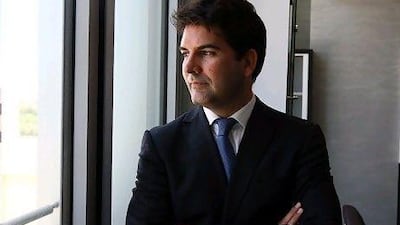After 11 years senior investment experience in Hong Kong, the UAE, Angola and Brazil, Raul Geraldes Silva, the chief executive of the newly launched United Investment Bank (UIB), personifies the "South Silk Road" theory of global economic development.
So another investment bank launches in Dubai International Finance Centre (DIFC). What's so special about UIB?
Essentially, UIB was born out of a need to satisfy the growing emerging market investment demand and to develop alternative investment funds in non-traditional asset classes - by alternative I'm talking about the location and industry sector. These may include uncorrelated assets that present very interesting returns versus traditional products. In addition to our experienced UIB team members, we also have a global network of partners, who are on the ground; they know where the wealth is, where it can be created, how it can be protected.
Tell me about your investors, United Financial Partners of Hong Kong. Who is behind that business?
United Financial Partners is formed of partners that include wealthy business families in the Middle East, and financiers with international experience.
It looks like you intend to focus on emerging markets. Is that because you believe the West is a spent economic force?
We find that investors don't simply want to put money into established markets with a somewhat tarnished track-record; so the question of where to invest is not surprisingly being reconsidered. Emerging markets are becoming increasingly sophisticated, less insecure and started adopting international banking standards from wealth management to fund structuring. Places such as Russia, Brazil, and India represent both opportunities and wealth. These aren't only destinations for investment, but also sources of investment. As a result of their own market growth, these organisations and individuals are now in a position to invest their own new-found wealth, and emerging markets are a persuasive choice. Europe and the US have been critical in establishing the financial frameworks that emerging markets now follow. But is there real growth? Many agree that the answer is no.
So you believe in the South Silk Road theory of economic and financial development, by which the Middle East becomes a conduit for business between Asia, Africa and South America?
Yes absolutely. Let me put it this way; we don't view UIB as a Dubai bank but an international bank located in Dubai. All we need to do is look around our malls, offices, airports to understand that this is a multicultural, increasingly sophisticated business hub. There are social and economic challenges that the Middle East may face, but there remain so many people from different cultures operating here because they want to see growth and create business opportunities. It's self-propagating; the more multicultural a market becomes the more it will become a hub for multi-market business, and this region has these cultural and geographic positives on its side.
Parts of the Middle East look very investor unfriendly at the moment. What business do you see in countries such as Egypt, Tunisia or Syria?
While some of the markets are considered to be very unstable now, their large consuming populations means it won't stop people looking towards them for secondary industry, such as manufacturing. These countries often have a relatively skilled, young, educated workforce, as well as domestic markets and international access. To rule them out because of current unrest would be unwise. They may not be top choice in terms of security, but I think they will remain places people look at when deciding where to build business in the next decade.
What sectors attract you?
We're focused on industries that present some of the best global investment opportunities, and have deep knowledge and experience in sectors including oil & gas, renewable energy, sports, hospitality, entertainment, real estate and agribusiness. Sectors that perhaps have been under financed and are still in need of development. Or, in certain cases, where money is currently made but where they haven't been structured to allow outside investors to participate through a fund environment.
Why did you base yourself in Dubai, rather than another financial centre such Abu Dhabi, Doha or Bahrain?
As well as the regulatory strengths of DIFC and the DFSA [Dubai Financial Services Authority], I feel this is a jurisdiction that supports international investments in a way that is more familiar to our clients - since it is based in common law. Also, when setting up an international business that's likely to involve people from across the world, you look for a destination that is cosmopolitan, desirable to live in, with a strong talent pool and supported by a good transportation system and efficient business infrastructure - Dubai represents that place to me.
Investment advisers in Dubai have been fighting for a limited amount of business this year. You may have found a gap in the market, but is there a market in the gap?
Absolutely. The way I see it is that there is a gap in terms of service offering but not in terms of investors and opportunities - that is fairly well established. Accessing those investors and opportunities cross-border into emerging markets, this is the service that needs to be provided and that is exactly what we intend to do. Furthermore, there are large financial institutions that have liquidity but are limited in terms of investment vehicles so we will be developing alternative products for them, mainly in the Gulf.

